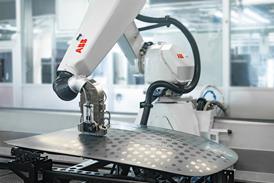All Manufacturing engineering articles – Page 5
-
 Article
ArticleJLR – Putting sustainability at the centre of its strategy
JLR’s manufacturing sustainability transformation lead, Garrett Bell, shares some insights in how the business is reducing its carbon footprint across its operations
-
 News
NewsLEVC starts production of its new L380 MPV
The prototype of LEVC’s first fully electric model based on its new Space Oriented Architecture (SOA) has rolled off the assembly line in Yiwu, China
-
 News
NewsPorsche launches all-electric Macan
Porsche will build its first Porsche models on the PPE platform at its factory in Leipzig, Germany.
-
Webinar
Watch Now: Shaping the future: How electric vehicles are driving manufacturing decisions
Explore electric vehicle (EV) architecture design and manufacturing complexities, from flexible platforms to battery integration challenges.
-
 Article
ArticleDesign and manufacturing integration, digitalisation key to cost and sustainability gains for BMW’s Neue Klasse
To realise large cost and emission savings on its EV architecture, BMW is redesigning vehicles and manufacturing in parallel, and rolling out rapid digital solutions.
-
 Article
ArticleA class of its own: transforming BMW production for next-gen EVs
BMW’s home plant will produce only EVs by 2027, with much of the century-old factory rebuilt to meet new levels of efficiency and digitalisation, without missing a beat of ongoing production.
-
 Voice
VoiceHenkel supports innovation with Battery Engineering Center
Experts at Henkel, a global leader in adhesives, sealants and functional coatings, explain the benefits of the new Battery Engineering Center, and how it solidifies Henkel’s role as a premier design and innovation partner for OEMs in the automotive industry.
-
 News
NewsThe state and stipulation of automotive production: Retrospect 2023 to prospect 2024
In 2023, the automotive industry underwent a transformative journey, adapting to trends such as sustainable materials, electric vehicle dominance and digitalisation. But what clues does 2023 provide about the vehicle manufacturing landscape in 2024?
-
 Magazine
MagazineAMS Winter 2023/24 – BMW’s battery boost
BMW is aiming to achieve ‘expertise in every cell’ of its generation six batteries
-
 Article
ArticleHow battery and electric motors and EVs are reshaping the European automotive supply chain
How major automakers adapt to the EV surge, transforming manufacturing and supply chains. Delve into the strategic shifts at Ford, JLR, and Volkswagen, the rise of Chinese suppliers, and the regulatory forces reshaping the automotive landscape. Join us on a concise journey through Europe’s electrifying automotive future
-
 News
NewsGM secures ex-Tesla gigacasting specialist TEI: portents of a production pivot?
GM’s recent acquisition of TEI, a company with a notable history of collaboration with Tesla in pioneering gigacasting technology, has set the automotive industry abuzz. With an estimated value approaching $100m the strategic move may indicated GM’s positioning to bolster its manufacturing capabilities in gigacasting.
-
 News
NewsPorsche pushes mixed production at Zuffenhausen with €250m investment
Porsche’s Zuffenhausen plant enters a new era, blending traditional lines with innovation as it prepares to roll out the next generation of sports cars.
-
 News
NewsImpact of UAW strikes could leave suppliers at financial risk
Despite tentative deals, the impact of the UAW strikes on Ford, GM and Stellantis could have already put suppliers at financial risk.
-
 Video
VideoFord’s Paul Stephens on EV opportunities and greenfield sites
Paul Stephens, Manufacturing and Transformation lead at Ford Motor Company discusses talent, technology and learning from past mistakes at Automotive Evolution North America 2023.
-
 News
NewsStellantis’ FBD brainstorms to solve automotive production challenges
The eighth instalment of Factory Booster Day produced ninety-nine solutions demonstrated by sixty-four partners to tackle thirty-five Stellantis plant challenges setting an example to other OEMs
-
 Article
ArticleNew world order: How the US is boosting EV production with new technologies and investment
The US is leading the way in the transition to EVs, with significant government support to increase domestic battery production and new technologies.
-
 News
NewsBMW: ‘Flexibility is in our genes’
BMW, Mini and Rolls Royce are driving a tight electrification course. Nevertheless, the group remains open to drive diversity. In an interview, production director Milan Nedeljković talks about flexibility and the concept of the iFactory.
-
 News
NewsHow BMW will maintain quality in its 3,000-step battery cell production process
At its recently opened German Cell Manufacturing Competence Centre (CMCC) in Parsdorf, BMW is aiming to achieve ‘expertise in every cell’ of its generation six batteries for its Neue Klasse EV models.
-
 News
NewsBMW begins production at German cell manufacturing competence centre
BMW has started production of cylindrical battery cells at its €170m Cell Manufacturing Competence Centre (CMCC) inear Munich in Parsdorf, Germany.
-
 News
NewsJLR expands EV production to Slovakia
JLR has announced that it will develop its plant in Nitra, Slovakia to produce electric vehicles by 2030.

































